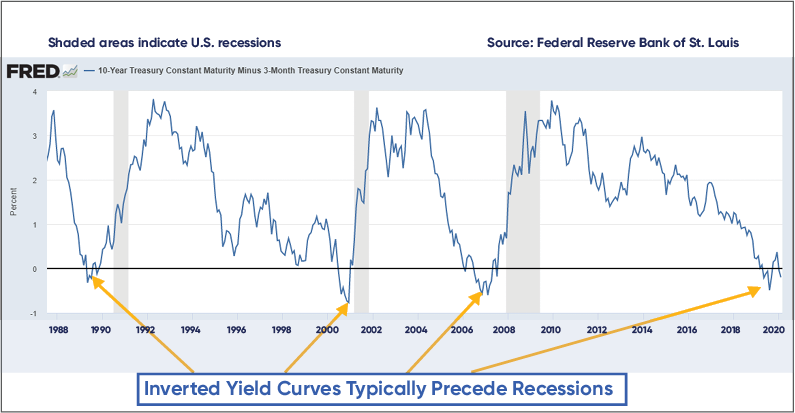Many of us approached 2019 holding our breath, waiting for the recession economists had predicted for the U.S. economy. However, as we approach the year 2020, it’s safe to say 2019 earned the title of “The Recession…That Wasn’t.”
With the U.S. election coming up, people are predicting that the recession is right around the corner. And what’s behind all the recession talk? Trade Wars and The Inverted Yield Curve.
Professionals who analyze economic trends and models, however, state there’s only a 35% likelihood of a recession in 2020. With that being said, we can predict a promising year ahead.
Trade Wars:
The U.S. has been dealing with trade wars since 2018. If trade wars haven’t already caused a recession, we can predict that they won’t in 2020. Only about 6% of our GDP comes from exports, so even if that number changed to 0% that’s still not enough to start a full-blown recession. In addition, while GDP was once a reliable indicator of the U.S. economy, it isn’t as reliable today.
Inverted Yield Curve
New factors make yield-curve inversions more likely. However, the power of the yield curve has declined significantly. The more frequent inverted yield curve comes from businesses who have begun making long-term decisions instead of short-term, with short-term growth being unpredictable. A dip in the yield curve does not cause or necessarily predict a recession.

Reliable indicators that could once help us measure the economy, like the stock market and oil prices, aren’t as reliable today. We also can’t analyze economic trends in countries like Japan and Germany as easily because recessions in those countries look different than they did 20 years ago. Japan already has more citizens retired than working. Germany will be next, with the U.S. following close behind.
We live in a country where the population still has more people working than retired. If we want to measure how the economy is doing, we should measure income per person. Today, Japan’s economy could experience a technical recession, but because their workforce is shrinking, their working population won’t feel it. That’s the direction the U.S. will be headed in the next 10 years.
We can’t escape these factors in 2020, but economists believe it’s not enough to start a full-blown recession. Is the environment more uncertain than it was last year? Yes. Are there some things weighing on corporate America that are making them think more long-term than short-term? Yes. The expert consensus continues to be to focus on making decisions that will impact long term objectives in the face of short-term uncertainty. Time will tell if the upcoming election and/or the coronavirus will influence the next recession, but for now we are optimistic for what 2020 will bring for the economy.
The following information came from Expert Economic Forecaster, Dr. Marci Rossell.



